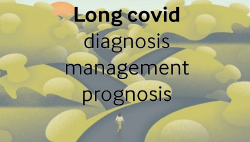Family friends of ours set off last week to drive to see their son who is in his first term at university. They had a call in the middle of the journey – their son had been hospitalised with Coronavirus. Not long ago, a friend of mine was out on his mountain bike with a bunch of his mates for their weekly sprint. He had a stroke as he was cycling and ended up in hospital for three weeks – a result of the blood disorders caused after having had COVID-19 in April. A surgeon we know of remains off work months after contracting the virus because his ability to concentrate is still in doubt.
 As the CNN reporter, Richard Quest, has so eloquently reported, this virus can and does impact young and middle-aged adults, sometimes with devastating and long-lasting implications. Long Covid is becoming recognised as a debilitating affliction among people of working age, and the BMJ webinar throws light on that.
As the CNN reporter, Richard Quest, has so eloquently reported, this virus can and does impact young and middle-aged adults, sometimes with devastating and long-lasting implications. Long Covid is becoming recognised as a debilitating affliction among people of working age, and the BMJ webinar throws light on that.
- Richard Quest: I got Covid-19 two months ago. I’m still discovering new areas of damage)
- BMJ: Long covid: How to define it and how to manage it
Sickness is much more widespread than death, and across all ages from teenagers upwards. Mathematically, sickness will always outnumber fatalities by many times – the more effective treatments become, the fewer the deaths, but good treatment doesn’t reduce the numbers that get ill, it just reduces the severity of the outcome.
It’s regrettable that complex messages don’t suit the times. Argumentative groups with strongly held beliefs or mischievous intentions resort to loud simplicities and shocking one liners. Consequently, opinion and debate has settled into the perception that what’s at stake is death among the old and already sick, and these things are remote for much of the public.
The law of averages means that some decision makers will have some fatalities to deal with, but the laws of sickness give them a much bigger and more numerous headache to deal with from the implications, disruptions, knock-on effects and uncertainties of illness.
Analysis for 7 October, 2020
Government and the NHS are concentrated on averting the catastrophe of being overwhelmed by the sick, not the dead, although those are also a concern. Physical capacity is ready, thanks to the massive achievement in getting Nightingale hospitals built and ready. Tens of thousands of beds are now available. Just as well considering that current hospitalisation stand at around 12,500 when there were only 4,100 ICU beds in total, nation-wide, in March.
For our health system, staffing is the critical constraint in being able to look after the sick in hospital from all afflictions – road accidents, cancer, alcohol and substance abuse, and all the other things that malcontents and everyone else could suffer from – as well as Coronavirus. Ironically, sickness among staff in the NHS is a ballooning problem, giving decision makers there a compounding issue of sickness affecting the ability to treat sickness. In March, April and May combined, NHS staff lost a total of more than 1.3 million full time equivalent (FTE) days due to COVID-19 and related reasons.
For decision makers elsewhere, sickness is the growing problem looming out of the pandemic. Our friends’ son is out of hospital but that doesn’t mean that he’s fighting fit again yet. My friend’s three week hospitalisation for a stroke wasn’t the end of the matter. He’s well again now, thankfully, but there was an extended period off work, time out for tests and such, and a gradual climb back up to match fitness and a return to the C Suite. The surgeon is still not at work months later.
Even if these things are too complex or inconvenient to be discussed and debated in public, for the boardrooms and Zoom calls in all kinds of businesses and other organisations, it is sickness that presents the challenge ahead, not death. Moreover, the problems are likely to be persistent and hard to grip, with symptoms that are potentially long lasting, and some that get awkwardly close to malingering. Sickness is the risk that decision makers must manage, not fatalities – sickness of all kinds, not just Covid – and how to navigate the loss of capacity, critical people, the disruptions and the other implications to themselves and their customers.
These papers have some useful background
- CDC:
- WHO: Readiness for influenza during the COVID-19 pandemic
- NHS Employers: New statistics show COVID-19 related NHS staff sickness absence
- More than 30,000 days lost to Covid-related sickness at Greater Manchester hospitals at height of pandemic
Other pages related to Coronavirus:
- Covid-19 insight for decision-makers
- Navigation aids for decision makers in a Covid World
- Business decision making in a Covid world
Peter is chairman of Flexiion and has a number of other business interests. (c) 2020, Peter Osborn